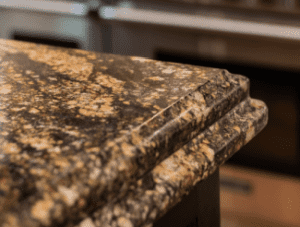Your Guide to the Real Cost of Granite Countertops

There are over 200 different types of granite in the marketplace, which vary by color, veining, and texture to make it an attractive option for homeowners and renters alike. But it’s also much less precious than alternatives like marble and quartzite since it’s harder.
Best of all, a granite countertop can give you a luxurious look for less compared to marble or onyx, which start at $60 and up. But before you embark on your next renovation, you probably want to hear about all the pros, cons, and cost breakdowns of granite.
So let’s take a deep dive into why so many people are gravitating toward this stone for their next renovation.
Characteristics of Granite
So first up—it’s important to know that granite inherently has a lot of variations. It’s an igneous stone, which is created from magma underground. Even the sample you get from a showroom will look slightly different from the actual granite slab installed in your home. It’s no secret that granite is a durable material that can withstand high heat, scratches, and stains. But did you know there are four crucial factors to consider when buying granite that will impact the price?
There are up to six or seven different grades of granite, but to keep it simple, anything that is a level three or above is high-grade granite because these slabs are rare in the marketplace. You should expect to spend $100 or more per square foot. The next tier is level two or mid-grade granite, which is $50 per square foot, and the most budget-friendly option is $30-$40.
The thickness of the granite matters, and as I am sure you’ve already guessed, the thicker the slab, the more substantial it is and the more expensive. Most slabs of granite countertops for a kitchen are one and 1/4 inches and in the bathroom a little shallower at 3/4 of an inch. The cost will also increase based on the number of cut-outs for the stone too. For example, if your want to add some unique upgrades like a cut-out for double sinks or for a trash opening.
So much of design comes down to the small details that add up. When you choose granite, you also need to factor in the style of the countertop edge. The most common are a beveled edge, half bullnose, and a straight edge. Most of these are built-in to the countertop cost, but an ogee or full bullnose edge is an upgrade that can cost $60 per linear square foot. Talk with your installer before you choose.
Get a Free Multifamily Loan Quote
Access Non-Recourse, 10+ Year Fixed, 30-Year Amortization
Labor Costs
It’s important to note for the average home renovation granite countertops will cost between $2,000 and $4,500, and most people are spending $3,250 for their countertops.
Unless you plan to install the kitchen cabinets on your own, you need to budget for labor costs which are between $35 to $85 an hour. Also, you should expect the installation process to take several hours or even an entire day. Granite is difficult to install due to its weight and size.
Some additional fees will apply if your installer removes old countertops, which cost an extra $20 per countertop. And if the cabinetry needs any repairs during installation, you guessed it, that’s an additional fee.
Maintenance and Upgrades
Lastly, granite is inherently durable, but if you want extra protection, you can seal it for low maintenance. You can seal it to protect against cracks, stains, and scratches for $170 to $350. It’s also important to know the grade of granite you own because it needs to be re-sealed yearly or once every 10 to 15 years.
Now that you know the facts about granite countertops, you can begin to plan your dream kitchen or bathroom renovation. Rest assured that you have the right questions to ask to ensure your renovation is stress-free—or at least less stressful. The best part is that granite is a long-term investment and adds value to your home.
Source: House Beautiful















 Accessibility
Accessibility